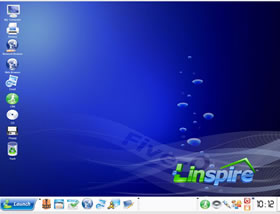 It’s not surprising that when an entrepreneur sees something as successful as Skype has been, (you can’t see over 127m downloads in any other way), that the word opportunity is writ large in their eyes. This is especially when that person likes disrupting legacy business models, such as the phone system.
It’s not surprising that when an entrepreneur sees something as successful as Skype has been, (you can’t see over 127m downloads in any other way), that the word opportunity is writ large in their eyes. This is especially when that person likes disrupting legacy business models, such as the phone system.
Enter Michael Robertson, he of mp3.com fame.
After selling mp3.com for a considerable amount of money, Mr Robertson went on to create Lindows. A Linux-based desktop operating system that aimed to take on Microsoft and their Windows product head on. After some huffing and puffing from Microsoft Lindows changed its name to the less controversial Linspire.
During the time of building up Linspire, I was surprised to see Robertson launched SIPPhone.com – his first pop at a VoIP business. When I first saw this it looked like a distraction from his OS business, almost like he saw the great opportunity of VoIP coming and couldn’t resist jumping on top of it.
Well things have move on now, and after 6 months software development, Robinson is publicly showing his Skype-killer, Gizmo Project.
 The big differentiator between Gizmo Project (a temporary name – they’re asking for suggestions) and Skype is Gizmo uses the open standard of SIP (Session Initiation Protocol, for those who really want to know), as opposed to the proprietary method Skype uses. This goes after Skype in the only way it can.
The big differentiator between Gizmo Project (a temporary name – they’re asking for suggestions) and Skype is Gizmo uses the open standard of SIP (Session Initiation Protocol, for those who really want to know), as opposed to the proprietary method Skype uses. This goes after Skype in the only way it can.
Many of the early users of Skype were hardcore Linux/Open source fans. Although using Skype was free, it still stuck in their throats a little that they were talking over proprietary protocols.
Skype doesn’t allow connections to other VoIP service, and as they control all of the inside processing, if they don’t want it to happen, it won’t.
Robertson claims that as Gizmo is SIP-based, it will interconnect to any other phone system.
Using Gizmo Once the software is installed, anyone familiar with Skype will not have a problem quickly adapting to use Gizmo. It runs on Linux, Macintosh and Windows. It appears to have all of Skype’s functions plus quite a few extras.
Useful additional features include a call quality meter, located at the bottom left of the app.
Gee whiz factor is provided by features like the World map that can be summoned up, showing you how far you are calling – good for gloating that you’re not paying a penny extra for calling that distance.
Despite the product being in beta, it’s currently on version 0.8, Gizmo haven’t been slow in holding back on the in and outbound call features – the ones that generate the income. It was surprising to see that the pricing of Gizmo In is more expensive than SkypeIn, with the $30 buying just 6 months of service compared with Skypes – I thought new entrants to a market were supposed to be more competitive not half the value.
 Skype has done well in encouraging other companies to build extra software and importantly, hardware including phone handsets (Siemens M34; Cyberphone K). This has been enabled by them publishing the API (Application Program Interface). As to whether/if Gizmo will have an API as Skype does, is as yet unclear.
Skype has done well in encouraging other companies to build extra software and importantly, hardware including phone handsets (Siemens M34; Cyberphone K). This has been enabled by them publishing the API (Application Program Interface). As to whether/if Gizmo will have an API as Skype does, is as yet unclear.
Trying to unseat Skype is one hell of a tough battle; it’s seriously entrenched in the tech world, and is making pretty strong moves in to the general market.
The fact that it uses open protocols is a big advantage, if that kind of thing is important to you. For the rest of the market what’s important is that they’re able to speak to their friends on the service. As things stand today, that is probably Skype.
Expect a rash of these applications.
Gizmo Project
 Looks like there’s a danger of some of the open-source software world and Microsoft breaking out into a huge big love in.
Looks like there’s a danger of some of the open-source software world and Microsoft breaking out into a huge big love in. Michael Robertson, the founder of mp3.com, has been investing him money in many interesting, and rather ambitious ways that we’ve covered, such as a competitor to Windows OS –
Michael Robertson, the founder of mp3.com, has been investing him money in many interesting, and rather ambitious ways that we’ve covered, such as a competitor to Windows OS –  It’s not surprising that when an entrepreneur sees something as successful as Skype has been, (you can’t see over 127m downloads in any other way), that the word opportunity is writ large in their eyes. This is especially when that person likes disrupting legacy business models, such as the phone system.
It’s not surprising that when an entrepreneur sees something as successful as Skype has been, (you can’t see over 127m downloads in any other way), that the word opportunity is writ large in their eyes. This is especially when that person likes disrupting legacy business models, such as the phone system. The big differentiator between Gizmo Project (a temporary name – they’re asking for suggestions) and Skype is Gizmo uses the open standard of SIP (Session Initiation Protocol, for those who really want to know), as opposed to the proprietary method Skype uses. This goes after Skype in the only way it can.
The big differentiator between Gizmo Project (a temporary name – they’re asking for suggestions) and Skype is Gizmo uses the open standard of SIP (Session Initiation Protocol, for those who really want to know), as opposed to the proprietary method Skype uses. This goes after Skype in the only way it can. Skype has done well in encouraging other companies to build extra software and importantly, hardware including phone handsets (
Skype has done well in encouraging other companies to build extra software and importantly, hardware including phone handsets ( Michael Robertson, one of the founders of MP3.com, is to return to the world of downloaded music.
Michael Robertson, one of the founders of MP3.com, is to return to the world of downloaded music.